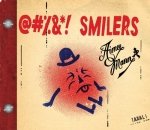If Avril Lavigne was supposed to be the anti-Britney, then Virginia's own Aimee Mann must be the anti-DiFranco. This means they have aesthetic differences, but are actually quite similar in essence. Instead of the sexually righteous and vigorously political folk that Ani releases on her own label, Aimee began with a major label new wave band called ’Til Tuesday back in the mid-’80s. Despite the eventual addition of now-famed producer Jon Brion to the lineup, the band broke up early into the ’90s. Aimee wanted to instead concentrate on her solo career, which would focus more on dysfunctional people battling various states of addiction and dependency, as well as rich studio arrangements instead of synth-pop.
Mann's label dissolved after her first effort in 1993. She struggled to get promotion for her 1995 album I'm With Stupid, and Geffen "didn't hear any hits" on her third. As she battled with Geffen, Paul Thomas Anderson patterned several characters in his opus Magnolia after songs from the subsequently released Bachelor No. 2 or, the Last Remains of the Dodo. "Save Me" would go on to be nominated for both a Grammy and an Academy Award and properly introduce her to a new generation of fans. Once free from her final major label contract, she founded her own label and hasn't looked back since.
Counting the 2006 Christmas album One More Drifter In The Snow, @#%&*! Smilers is her seventh solo album to date, and her movement shows no sign of slowing. She has always enjoyed widespread critic support, but since Magnolia, she has been given the horses as well as the cart. Aimee supports her own devoted scene through a well-kept website, a mailing list, and consistent releases. Since Bachelor No. 2, her albums have all maintained a similarly respectable level of production value, and she hasn't changed a bit stylistically. While DiFranco usually tells first-person accounts of injustice and cute love, Mann has shaped her solo career around a series of detached, character-driven narratives, often if not always dark and depressing. Aimee doesn't try to reinvent the wheel every time out. She is merely good to her loved ones while trying to become a better version of herself.
The most noticeable difference between the 2005 concept album The Forgotten Arm and @#%&*! Smilers is the loss of electric guitar, which has been ditched in lieu of distorted Wurlitzers, Clavinets, and layers of analog synths. Also notable, the previously samples strings and horns have been upgraded to the real thing. Her songwriting is instantly recognizable, still stewing on eccentric dysfunctionals, but the canvas within which the album is painted draws her characters in a new relief, yet somewhat hearkening back to her mid-’80s output. The effect is simultaneously refreshing and reassuring.
"Freeway" opens the album with the story of a junkie moving to LA to escape the past. The chorus "You've got a lot of money, but you can't afford the freeway" is not the best in her songbook, but the Tegan And Sara-meets-Cars instrumental sets the tone for the work. The rhythm section apes a slower version of the beat from The Breeders' "Cannonball," while a piano and a lightly strummed acoustic guitar support a continually searching vintage synth. Flowing from an instance of love on the rocks, "Phoenix" would not have sounded out of place as a cover on Beck's Sea Change. Its interplay of folk, acoustic, and rich strings will tease the fragile heart as much as the words.
Getting back to a comfort zone, "Medicine Wheel" and "Columbus Ave" form the warm core of @#%&*! Smilers. Based on a poem of regrettable but necessary exile as written by Mann's sister, "Medicine Wheel" lasts only one stanza, using only piano and a little organ until the rhythm section kicks in alongside wholesome horns. It sounds like a late-’70s radio single. Elsewhere, "Columbus Ave" investigates an addict's ambition on an infamous San Francisco street with a bass and acoustic slowly joined by piano, strings, and drums. The track seems to tease you along, subtly drawing you in while not leaving you anything really solid to stand on, much like addiction itself. Together, these songs pack a powerful one-two punch.
Although songs were meticulously plotted out in rehearsal, Mann and her new producer Paul Bryan kept their studio time down to one or two takes per track to give them a fresher feel. She is a flawless live performer, almost to a fault, but the effort comes across in the recording. Her lyrics still speak of a kind of dissonance and disconnectedness, while the music has not been this immediate and intimate in years. She is not merely trying to rewrite the Magnolia soundtrack over and over in search of another Grammy nod. @#%&*! Smilers walks its own path as a uniquely beautiful addition to Mann's already impressive catalogue.
More about: Aimee Mann



